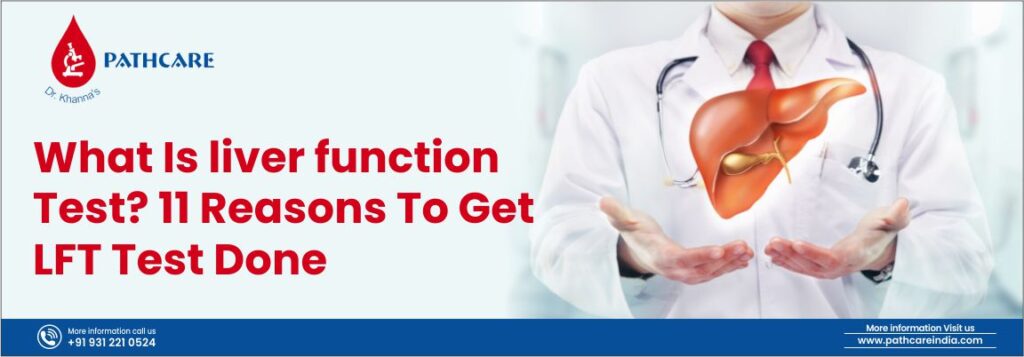No products in the cart.
An assessment of liver health is performed by a liver function test (LFT). In addition to detecting inflammation, infection, diseases, etc., the test also gauges and monitors damage caused by liver-related issues.
Overview of Liver Function Test (LFT)
In comparison to its numerous benefits, the LFT test costs virtually nothing compared to its benefits for detecting liver disease or monitoring liver-related conditions. The liver function test (LFT) is a panel of blood tests that measure the levels of certain enzymes and proteins in the blood to determine how well the liver is functioning. In the normal range for the LFT test, biomarkers include SGOT, SGPT, GGTP, alkaline phosphatase, bilirubin, globulin, albumin, etc.
The liver is an extremely vital organ that controls the body’s metabolism and cleans it by filtering out toxins and waste from the blood. If the liver isn’t working right, toxins and waste build up in the blood, which a simple blood test for liver function can show.
These tests are included in the LFT test:
Alkaline Phosphatase
(Includes: 1 Test)
Bilirubin Total and Direct Test
(Includes: 2 Tests)
Total Protein Test
(Includes: 1 Test)
Globulin
(Includes: 1 Test)
A.G. ratio
(Includes: 1 Test)
Albumin Test
(Includes: 1 Test)
SGOT- Aspartate Transaminase (AST)
(Includes: 1 Test)
SGPT- Alanine Transaminase (ALT)
(Includes: 1 Test)
GGTP (Gamma GT), Serum
(Includes: 1 Test)
Brief description of each test:-
- Alanine transaminase (ALT). An enzyme called ALT helps liver cells convert proteins into energy. Damage to the liver leads to an increase in ALT levels in the bloodstream.
- Aspartate transaminase (AST). The AST enzyme is responsible for metabolizing amino acids. Like ALT, AST is normally low in the blood. AST levels can increase in response to liver damage, disease, or muscle damage.
- Alkaline phosphatase (ALP). As an enzyme, ALP is found in the liver and bones and plays a vital role in protein digestion. An elevated level of ALP may indicate liver damage or disease, such as a blocked bile duct.
- Albumin and total protein. The liver produces several proteins, including albumin. These proteins help your body fight infections and perform other functions. There is a possibility that liver damage or disease may be indicated by lower-than-normal levels of albumin and total protein.
- Bilirubin. During red blood cell breakdown, bilirubin is formed. A small amount of bilirubin passes through the liver and is excreted in the stool. An elevated level of bilirubin (jaundice) may indicate liver disease or damage.
- Gamma-glutamyltransferase (GGT). The GGT enzyme is found in the blood. A high level may indicate damage to the liver or bile ducts.
- L-lactate dehydrogenase (LD). LD is an enzyme found in the liver. Elevated levels may indicate liver damage but can be elevated in many other disorders.
- Prothrombin time (PT). The PT is the time it takes for your blood to clot. In addition to liver damage, elevated PT can also be caused by blood-thinning medications such as warfarin.
Liver Function Tests: Why Are They Done?
It might be used to check for liver diseases such as hepatitis (which causes your liver to swell and can cause serious problems). Liver problems are generally characterized by the following symptoms:-
- Lack of appetite,
- Nausea or vomiting,
- Feeling fatigued or tired,
- Yellow discoloration of eyes or skin (jaundice),
- Dark urine or light-colored poop (less common),
- Swelling in your belly (less common).
Cost of Liver Function Test at Path Care India
Test Type | Cost |
Liver Function Test (LFT) Cost | Rs.350 to Rs.1500 approximately. |
Preparation for the LFT test requires fasting (not eating or drinking) for 10-12 hours before the collection of samples for the test. Report for the LFT test at Path care India will be available in 24 hours
Note: A liver function test (LFT) cost in India may vary depending on the city where the test is conducted.
Book a liver function test (LFT) at Path Care, India. Call us at +91-11-46123456.
Normal Values for LFT Test/How to read your LFT test report?
Proteins/Enzyme | Normal Levels |
Aspartate aminotransferase (AST) | 8 to 48 U/L |
Alkaline phosphatase (ALP) | 40 to 129 U/L |
Albumin | 3.5 to 5.0 (g/dL) |
Total protein | 6.3 to 7.9 g/dL |
Bilirubin | 0.1 to 1.2 (mg/dL) |
Gamma-glutamyl transferase (GGT) | 8 to 61 U/L |
L-lactate dehydrogenase (LD) | 122 to 222 U/L |
Prothrombin time (PT/INR) | 9.4 to 12.5 seconds |
Alanine transaminase (ALT) test | 7 to 55 (U/L) |
Values above and below the normal range are considered abnormal, and you should consult your healthcare provider for a proper diagnosis and treatment.
Who should you have the LFT test conducted in routine?
The LFT test is a critical measure of your liver function. However, the following individuals are at greater risk for developing liver disease:
- Drink heavily or have an alcohol use disorder,
- Have a family history of liver disease,
- Obese and overweight individuals, especially if you also have diabetes or high blood pressure,
- You are a chronic user of medicines which may harm liver,
- If you have issues with gallbladder or anemia.
Our team at Path Care, India is experienced in performing LFT tests with precision and accuracy. We maintain proper sterilization conditions and minimize infection chances. We do have a home collection facility where our phlebotomist will come to your doorstep to collect the sample, so book your test today!
Related Videos
Related Post

Are you feeling unusually tired and frail? Is your appetite declining steadily without any apparent reason? It’s time to get a liver function test done! ……
FAQ’s
Yes, an LFT test can find fatty liver disease accurately if the levels of SGOT and SGPT are not in the normal range.
Elevated liver enzymes often indicate inflammation or damage to liver cells. When liver cells are inflamed or hurt, chemicals like liver enzymes can leak into the bloodstream. This makes liver enzymes in blood tests go up.
It is easier for liver specialists to understand whether a person’s liver is functioning correctly, injured, or inflamed when they check the results of specific blood tests. These tests help a hepatologist differentiate between chronic and acute liver diseases. Here are the most prevalent kidney function tests.
Serum Bilirubin Test – The sole objective of conducting this test is to measure the bilirubin levels in the blood. The liver is responsible for the creation of bilirubin and its excretion in the bile. Increased bilirubin levels are a clear indication of a bile flow impediment or an issue with the liver’s ability to process bile.
Serum Albumin Test – This particular test helps measure albumin levels in the blood. One needs to undergo this vital test for liver disease diagnosis. The liver stops working properly because of low albumin levels.
If you wish to bring down the results of your liver function tests, here’s what you must do:
- Exercise regularly
- Make changes to your diet
- Lose weight
- Prioritise intake of folic acid
- Avoid smoking and drinking alcohol
You must consult your doctor about preparing for a liver function test. Make sure you listen to your physician and do as per recommendation. It is advisable to stop drinking and eating for at least eight to twelve hours before a liver function test. Your doctor might tell you to stop taking daily medicines because some medications can adversely impact the test results.

